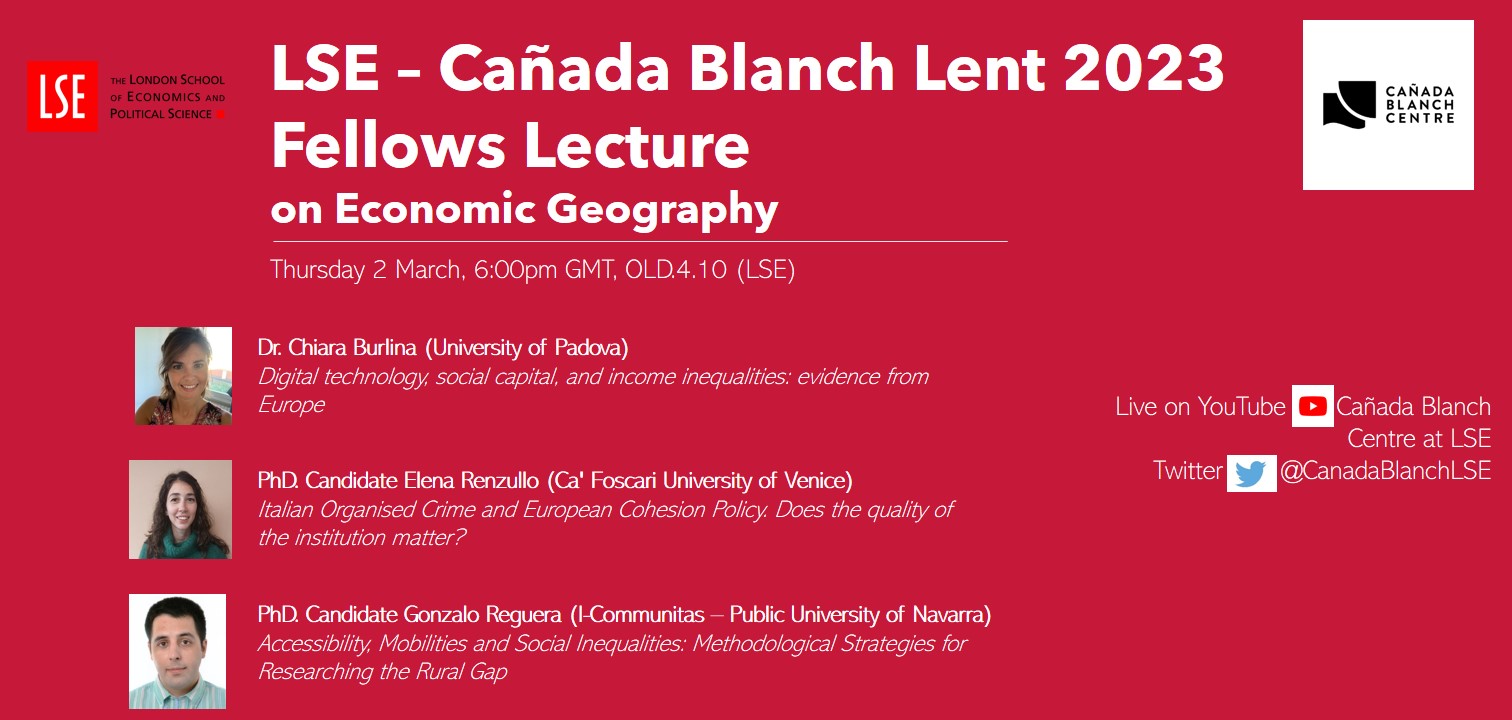Each term the Cañada-Blanch Centre at LSE organises a Fellow Lecture in which his visiting LSE-Miguel Dols Fellows present their ongoing research.

Meet our speakers
Dr. Chiara Burlina (Current LSE-Miguel Dols Fellow Lent Term 2023). She is Assistant Professor at the Department of Economics and Management, University of Padova. Her research interests lie at the intersection of Applied Microeconomics, Regional Economics, Economic Geography, and Institutions. Her research specifically explores how different economic factors impact the development of regions, based on a quantitative approach.
Digital technology, social capital, and income inequalities: evidence from Europe
Several studies are investigating the effect of digital technologies, like robotics and ICTs, on income inequalities. However none of these studies consider the role of social capital, as a moderating element in the relation among digital technologies and inequalities. The present paper aims to fill this gap in the literature analysing whether regions with higher endowments of social capital are those where digital technologies prevent the rise of inequalities. We expect that regions with higher endowments of social capital, in particular bridging social capital, will moderate the negative effects of digital technologies on income distribution, favouring mutual aid organizations helping those people who lost a job as the consequence of the event of machines and robots.
PhD. Candidate Elena Renzullo (Current LSE-Miguel Dols Fellow Lent Term 2023). She is a fourth-year PhD Candidate in Economics at Ca’ Foscari University of Venice, focusing on the intersection of Public Economics, Political Economics, and Regional Economics. Her PhD. dissertation investigates the relationship between local electoral outcomes in Southern Italy and European Cohesion Policy.
Italian Organised Crime and European Cohesion Policy. Does the quality of the institution matter?, coauthor with Dr. Marco Di Cataldo
The quality of institutions is regarded as a fundamental factor for the success of the European Cohesion Policy. This work studies whether the control and the collusion of local politicians with criminals and pressure groups, one crucial aspect of the quality of government, is detrimental to the effective implementation of the EU Cohesion Policy. Exploiting southern Italy as a testing ground, this work analyses if mafia infiltrations in Italian municipal government – identified by the Italian Law 164/1991 - alters the allocation of EU investments toward thematics in line with the interest of criminal organizations harming the common interest.
PhD. Candidate Gonzalo Reguera-Zaratiegui (Current LSE-Miguel Dols Fellow Lent Term 2023). He is currently undertaking his Ph.D. studies in “Rural sociology, mobilities and social research” at I-COMMUNITAS - Institute for Advanced Social Research, of the Public University of Navarre (Spain), focusing on socio-territorial cohesion and mobility.
Accessibility, Mobilities and Social Inequalities: Methodological Strategies for Researching the Rural Gap
Camarero and Oliva (2019) talk about the “rural gap” to refer to the differential in quality of life, services and opportunities that these spaces suffer with regard to urban environments. This tendency challenges the equality of rights and opportunities that citizens are expected to enjoy, regardless of where they live. This talk focuses on the factor of mobility in rural areas, exploring its importance and how it conditions accessibility to essential services and leads to inequalities.
Meet our chair
Prof. Andrés Rodríguez-Pose is the Princesa de Asturias Chair and a Professor of Economic Geography at the London School of Economics. He is the Director of the Cañada Blanch Centre LSE. He is a former Head of the Department of Geography and Environment between 2006 and 2009. He is a past-President of the Regional Science Association International (RSAI) (2015-2017) and served as Vice-President of the RSAI in 2014. He was also Vice-President (2012-2013) and Secretary (2001-2005) of the European Regional Science Association.
More about this event
The Cañada-Blanch Centre at LSE is the vehicle to achieve the objective of the Fundación Cañada Blanch: developing and reinforcing the links between the United Kingdom and Spain. This is done by means of fostering cutting-edge knowledge generation and joint research projects between researchers in the United Kingdom, and at the LSE in particular, on the one hand, and Spain, on the other.
You can follow us in Twitter.
Or the speakers and chair, Dr. Chiara Burlina, PhD. Student Elena Renzullo, PhD. Student Gonzalo Reguera, Prof. Andrés Rodríguez-Pose.
LSE holds a wide range of events, covering many of the most controversial issues of the day, and speakers at our events may express views that cause offence. The views expressed by speakers at LSE events do not reflect the position or views of The London School of Economics and Political Science.
From time to time there are changes to event details so we strongly recommend that if you plan to attend this event you check back on this listing on the day of the event